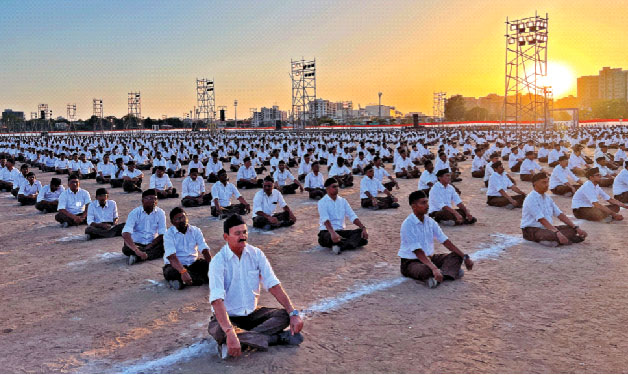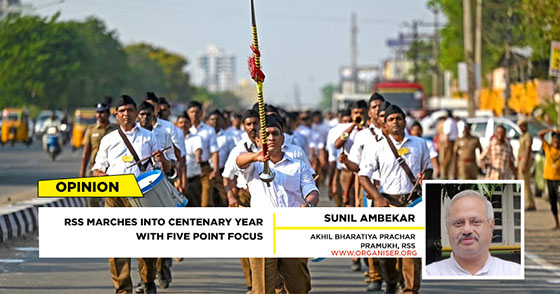The Rashtriya Swayamsevak Sangh is completing 100 years in 2025. Overcoming many difficulties in the long journey of the Sangh, the volunteers have expanded this work with the cooperation of the entire society. The 22 years after the formation of the Sangh was a period of struggle for independence. During this period, the Sangh swayamsevaks were actively participating in the freedom struggle and at the same time expanding the Sangh branches and strengthening the sense of ‘self’ within the society. Soon after the establishment of the Sangh, with the inspiration of Dr Hedgewar, in 1936, venerable Mavashi Kelkar started the Rashtra Sevika Samiti to work among women, on the lines of the Sangh. Before 1947, Swayamsevaks took the oath for Independence, and after Independence the goal has been the all-round upliftment of Hindu Rashtra. Naturally, while the work of the Sangh was expanding, the volunteers used to have comprehensive discussions about the happenings in various spheres of life and the positive changes that could be made in those areas. During the lifetime of Dr Hedgewar himself, we can witness his extensive participation in various social activities and his ideas for creating necessary structures from the Bharatiya point of view.

Inspired from this thought process of the Sangh, the volunteers started to weave a network of new organisations in various fields. Immediately after August 1947, students’ organisations were started under different local names and in 1948, this work was started all over the country under the same name. On July 9, 1949, the first organisation ‘Akhil Bharatiya Vidyarthi Parishad’ was registered and the nationwide work was formally started. In the earlier period, many organisations were started by volunteers in various fields. The Bharatiya Mazdoor Sangh (BMS) was formed for the welfare of laborers. Today there are 36 such main organisations, besides there are other such organisations limited to some provinces.
These organisations are basically functioning on the principle of ‘Nation First’ and keeping the basic objective of evolving structures that are in tune with the Bharatiya ethos and accessible to the common masses. The main task of system transformation has become the far-reaching goal of these organisations. Sangh mainly focusses on inculcating values and moulding individuals, and the Shakha is the primary unit for this work. Some of the karyakartas (volunteers) moulded through this process in turn contribute directly in the Sangh work for man-making for national reconstruction while others move on to different walks of life and contribute through the Sangh-inspired organisations.

In the early days volunteers were sent to these organisations, but now they are given as per the requirements of the organisations and some of them start working in these organisations on their own. As the organisations expand, many new non-volunteers come into contact with the organisations and work there with different key responsibilities. Such people also gradually become familiar with the work of the Sangh and become volunteers. For such newcomers, ‘Sangh Introduction Camps’ are conducted at different locations. This process is continuously strengthening both the team and the organisation with a healthy sense of coordination.
Though the other organisations are run by swayamsevaks, these organisations are autonomous in their respective fields. Their decision-making processes are independent and that’s the reason they have received great recognition from the society. These organisations consult the Sangh from time to time as required, but they take decisions on their own and exert their energies for the same. Just as this applies to the Vishva Hindu Parishad, it also applies to the BJP. Therefore, through this process, instead of paralysed organisations dependent on the Sangh, a number of important social organisations have taken shape, which are constantly developing and working towards system change. They are strong, independent, autonomous and self-reliant. This has resulted in an innate ability to create new organisations based on future needs.
COORDINATION PROCESS
The formal process of coordination involves organising annual coordination meetings at the provincial and all-India levels. Apart from this, various formal and informal meetings are organised from local to central levels from time to time. These meetings are attended by the Sangh Pracharaks and chief office bearers of the organisations. In the recent All India Coordination Meeting on September 14-16 , 2023 in Pune, 243 office bearers of 36 organisations and the Sangh participated. The agenda of these meetings is not to take decisions but to broaden the vision through sharing of experiences, achievements, opinions and ongoing efforts. While solving the problems of teachers and students, organisations such as Vidyarthi Parishad, Vidya Bharti, Educational Federation etc. are active in the field of Sangh-inspired education and are continuously trying to give a Bharatiya perspective to education. Naturally, they are also continuously working for the effective implementation of the new National Education Policy. Also, an attempt is made to create mutual agreement on economic, social and ideological issues through such meetings. At a time when some ideologies worked to keep different groups in conflict with each other, these Sangh-inspired organisations worked on building a spirit of family bonding based on the Hindu way of life. While the BMS is trying to find a way to bond workers and owners/management like a family, the Vidyarthi Parishad is building family spirit among the academic fraternity. An organisation like Seva Bharti coordinates with all charitable organisations in the society and gives more importance to the society than the organisation.
Participation of women in all organisations is an important topic discussed in every such meeting. For this purpose, an additional special system of ‘Women’s Coordination’ has been set up in the last few years, under which a special target is given to the leadership development and participation of women in various organisations. Like other organisations, in such a meeting, BJP workers also present their understanding of the political situation, their efforts and the possibility of success. People from outside try to analyse such meetings on the basis of the current situation. But such discussions are a regular part of the Sangh’s coordination process. They are an enriching experience and help develop mutual understanding. It is rightly expected from organisations that everyone should work with a team spirit. Collective decision-making, insisting on the participation of the workers for their development, working with a pure spirit and the spirit of doing public welfare without compromising on the values of life are emphasised.
All the organisations are active in the work of systemic change while studying the issues of public interest, finding a way, with a participatory approach and wherever necessary, educating the concerned groups on the core issues. While doing so, sometimes difference of opinion come to the fore on few issues or on certain issues strong disagreements on the policy decision of the BJP-led Governments and the position of the Sangh inspired organisations. In such a scenario, wither amicable solutions are facilitated or decision to move ahead is accepted while agreeing to disagree. Difference of opinion should not lead to distancing of minds with irreparable discord is the primary approach in this regard. According to the discussion held in the Pune coordination meeting, all these organisations born out of the urge for social transformation are currently insisting on five main topics. Building a family system based on life values, spread of environment-friendly lifestyle, adoption of equality-harmony in individual-family-social life, manifestation of ‘self’ in every sphere of life, as well as compliance of civic duties in daily life. In the course of time, all the organisations will take initiatives in this regard in their respective fields.
All these organisations inspired by the Sangh are moving forward in continuous coordination with the spirit of family, the doors of all of them including the Sangh, are open round the clock for the service and welcome of all Bharatiyas.




















Comments